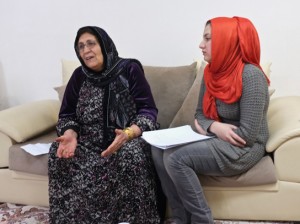This morning I wake to check the BBC regional news and read that 41 Shia Muslims have been killed in Iraq during Ashura, targeted by Sunni militants who have bombed religious processions. The festival marks the death of Hussein, the Prophet Muhammad’s grandson and is observed very strictly by Shias. It’s grim to think that there is so much intolerance and violence in the aftermath of the Allied invasion. Thankfully, there is no sign of that here, or at least not to the extent of carnage in the streets.
Our interview will be at 3.00pm so we catch up on some emails and paperwork, then wander through the bazaar, buying a few things to take home, enjoying the mild sunshine. It’s a visual feast, an endlessly fascinating process of consumption that ranges from basic foodstuffs to fridges, carpets, rugs, bolts of textiles and cooking equipment. There’s a little nip in the air to remind us that the season is turning, that soon it will be winter.
 Our first interviewee is Jamilia, mother of one of the researchers. They live in a comfortable one-story house near the University. She’s a retired teacher and women’s activist whose husband was imprisoned for five years under Saddam’s regime. All the researchers gather at the house for this test run. Muli and I explain the protocols, show Jamilia the consent form, then I talk everyone through the use of the tape recorder and get permission to take a photograph as the interview progresses. This is designed to move from recording some basic data to the narrative the women wish to share with us. We have some prompts in reserve, but there is no need for those with Jamilia. She speaks for twenty minutes fluently and with increasing passion. By the time she has finished, she and two of the researchers are in tears. Even though we can’t follow the Kurdish, we’re moved by the emotions her memories have stirred.
Our first interviewee is Jamilia, mother of one of the researchers. They live in a comfortable one-story house near the University. She’s a retired teacher and women’s activist whose husband was imprisoned for five years under Saddam’s regime. All the researchers gather at the house for this test run. Muli and I explain the protocols, show Jamilia the consent form, then I talk everyone through the use of the tape recorder and get permission to take a photograph as the interview progresses. This is designed to move from recording some basic data to the narrative the women wish to share with us. We have some prompts in reserve, but there is no need for those with Jamilia. She speaks for twenty minutes fluently and with increasing passion. By the time she has finished, she and two of the researchers are in tears. Even though we can’t follow the Kurdish, we’re moved by the emotions her memories have stirred.
We’ll offer each participant the opportunity to be photographed in a place of their own choosing, perhaps with a precious object that symbolizes some aspect of their life. Jamilia takes us into her little garden and poses in front of a photograph of her hometown of Rawanduz along with another of her husband behind prison bars. She picks herbs for us, immensely proud of her handiwork, then takes us back into the house where we sit cross-legged, Kurdish style, to eat figs, pomegranates, oranges and cucumber. Jamilia is obviously a women of great fortitude, but we can see that narrating the memories of those troubled times has left her sad and reflective. Aftercare is clearly something that we’ll need to build into the interview process.
We take our leave and Muli and I head back to the hotel before driving up to Pank for dinner. The huge restaurant is almost deserted and it’s impossible to escape the mildly pornographic Turkish music videos playing on a central TV with quadruple screens. Here the locals can drink alcohol and enjoy this kind of titillation, which is frowned upon in the city. Business is slow tonight, but occasionally a car will arrive and offload three or four young men who take up a table. There are no women here and it’s obvious that Pank is a fantasy resort, from the Ferris wheel to the tourist shop selling junk, to the images of sexual proximity that is forbidden in real life. It seems a curious, almost surreal, way to spend our last evening together.
Tomorrow will be spent packing, uploading our recording and writing up the last details of the project. The next job will be to enroll a photographer, create a model of transcription and translation, then locate the other 14 women in our study and schedule interviews with them. Meanwhile Muli will set up the new Writing Research Centre and I’ll create links to the project from Lancaster. There’s a lot to do, but we’ve been excited by the interview with Jamilia and the potential to move from interviews to translations that will open a window on women’s experience through the fighting and disruption in this region. I’ll be keeping in touch with the project by email and Skype as we consider how best to develop the material we’ve gathered and begin to plan the next phase. I’ll fly home to an English winter whilst Muli watches the mountains whiten with snow here. I’ll be back here in March to review progress, just as the spring gets under way. Inshallah.
Click here to see a gallery of pictures from Graham Mort’s visit to Soran
